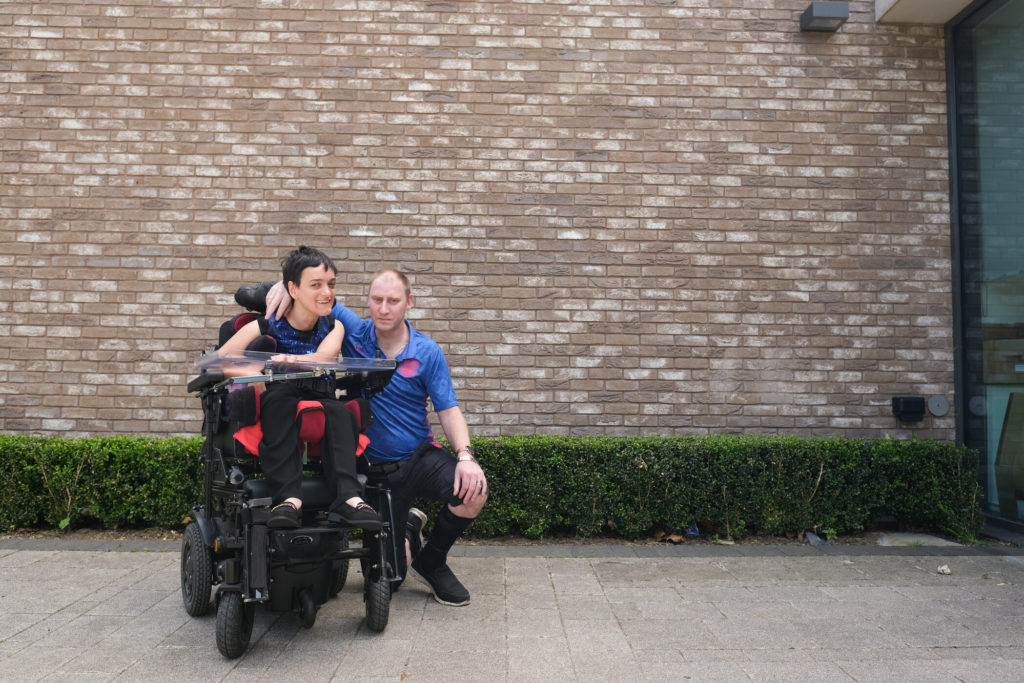We’re providing emergency financial support to disabled households – here’s why
Seven million people in poverty are either disabled or live with a disabled person. The government urgently needs to provide a long-term solution to the cost of living crisis. Until then, charities must shift their focus to help people in financial hardship. Sense CEO Richard Kramer explains what we’re doing.

In the wake of the pandemic, we had a health crisis, a social care crisis and an economic crisis.
We now have a poverty crisis.
Today’s situation has been decades in the making. Four million disabled people were living in poverty before the cost of living crisis. 42% of people living in families that rely on disability benefits are in poverty, according to the Social Market Foundation’s report, Time to Think Again. In total, the number of people in poverty who are either disabled or living with a disabled person is seven million.
We need a serious conversation about what it means to be disabled and poor in the UK today.
The cost of living crisis affects everyone – but not equally
The current crisis disproportionally affects disabled families. Over half of disabled households are in debt and nearly a third admitting to skipping meals to save money, according to Sense’s recent research.
There are additional costs associated with disability. Disabled people cannot simply choose to stop using energy for essential equipment like electric wheelchairs, oxygen machines, feeding pumps or nebulisers. They have to buy their own equipment and aids to complete basic tasks. They often need the heating on all day for medical conditions.
Families can only stretch a budget so far. At Sense, we hear first-hand about the dilemmas people face: parents cutting back on food or using food banks; families having to leave soiled clothes unwashed to save on energy; people struggling to afford to run lifesaving medical equipment, such as ventilators. The situation will only worsen when energy prices increase and winter kicks in.
The government has failed to help – so we’ve taken action
For months, we have been campaigning for the government to tackle the cost of living crisis and to offer long term support for disabled people. But we are frustrated by its lack of urgency.
Sense wanted to do something positive and practical to help and put more resources in the hands of disabled people and families affected by this poverty crisis. We understand that government, alone, cannot make all the difficulties completely go away given the scale of the problems that our country is facing. We must not let the government off the hook; however, it is incumbent on the voluntary sector to try and plug the immediate gaps where possible.
That’s why we’ve created the Sense Cost of Living Support Fund. We’re giving one-off emergency grants of £500 to 1,000 disabled households who are using Sense services and who are facing profound financial hardship. This fund is for disabled children and adults with complex disabilities, who are living with their families, on low incomes and struggling to pay for their essentials. We’ve partnered with the anti-poverty charity Turn2Us to administer the scheme. So far, we’ve distributed over half of the grants, and heard about the enormous difference it’s making in the lives of our families.
Catherine Ledsham from Cambridgeshire cares for her 22-year-old son Jack. Jack has cerebral palsy, epilepsy and a learning disability. Catherine told us about the additional costs that her family faces.
“Because of Jack’s condition he requires the support of specialist, essential equipment that needs to be constantly plugged in, using a lot of electricity, including a food pump, electric hoists and power chair. Our electricity and gas bill right now is more than £200.
“Then there is the additional water consumption that is required for personal care and additional laundry of clothing and bedding. And also the cost of driving Jack to college each day.”
With support from the Sense Cost of Living Support Fund, Catherine has been able to cover essential costs.
“The £500 we received from Sense’s support fund will pay for the repairs to the powerchair, which is a huge relief,” says Catherine. “Without it, we may have gone into debt. Having to constantly think and worry about the additional costs is horrible and it makes me quite low sometimes. You just don’t know where to go to for support. Government needs to do more to help with the cost of living crisis and social care costs families like ours are facing.”
We can’t call ourselves a proper living society unless we help people like Catherine and Jack.
We need to change the narrative around poverty and social care
While we hope this fund gives families some desperately needed support, we know it isn’t a solution to the wider problem. Government must do more to protect people facing financial hardship – our petition demanding they offer more support to disabled people now has over 25,000 signatures.
That said, charities must also offer as much support as they can. And we need to focus on telling a stronger story around poverty.
The poverty crisis doesn’t exist in a bubble. We need to draw the connection between poverty and the other pressures families face – the social care crisis, the lack of access to respite and cuts to statutory services.
We have to show that the best way to help people out of poverty is for government to bolster the benefit system and target support at those who most need it. We need to win the argument on social care and explain that it is especially important for people who are struggling financially. A stronger care system will help tackle poverty and ensure people have a decent life.
Charities played a crucial role in the national response to the pandemic. Charities need to change their focus and tell their story about poverty and the impact on the people they support. Together, we can come together and challenge attitudes in government and society and build the public and political will to tackle the cost of living crisis. Helping those who are at greatest risk of financial hardship is the right thing to do.
Sign the petition
Demand that the government does more to support disabled people during the cost of living crisis.
The Cost of Living Fund has now closed. We have more information about benefits and support available, or contact our Information and Advice service.

